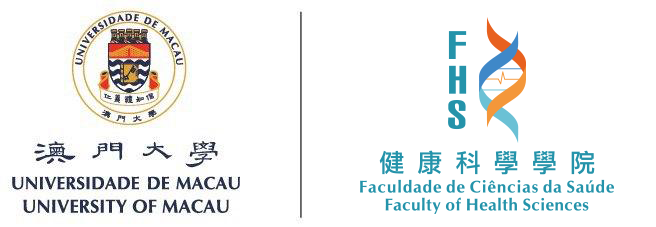Macau was hit by an epidemic from the middle of June to July this year. Facing the severe and sophisticated situation to prevent and control the epidemic, some members of the University of Macau (UM) Faculty of Health Sciences (FHS) echoed the call from the government to take part in the community work that combated the epidemic, while others stayed on campus to maintain the essential operations of the laboratories with an aim to ensure proper survival conditions for the laboratory animals such as rodents and zebrafish as well as the cells in culture.
In the FHS Animal Research Core, there are more than 15,000 laboratory rodents and 10,000 zebrafish which are made up of hundreds of strains. Almost all research laboratories of FHS also preserve and culture various kinds of cells for experiments in an unceasing manner. These “living” animals and materials are extremely precious biological resources for health science research in FHS and the painstaking efforts of researchers for years. During the static management, in order to ensure the survival of the laboratory animals and the proper growth and preservation of the cells, essential operations of some laboratories have never halted.
Because of the prevention measures, most of the members who work in the Animal Research Core were not able to return to work. Therefore, the operation manager Mr. Zheyu CAI as well as core technicians Ms. Avery TAM and Mr. Shaowen WANG shouldered the responsibilities of taking care of the rodent laboratory. The postdoctoral fellow Dr. Kun WU and several researchers were responsible for the essential operation of the aquatic room and husbandry of the zebrafish. Avery said, “Laboratory animals are living beings, we are fully responsible to protect their wellbeing at any time. In addition, the Core also hosts the laboratory animals for professors, students and researchers. We ought to guarantee their survival, which also protect their priceless efforts.”
Dr. Wu, who helped in the aquatic animal lab, said that he not only took care of the zebrafish, but also checked the instrument and recorded parameters of the fish room on a daily basis. It is always important to identify abnormalities in time to prevent breakdown that risks the survival of the zebrafish. During that period, the service provider to maintain the aquatic animal lab has suspended its on-site services, and it could have resulted in a terrific loss if there was a major failure. Without any hesitation, Dr. Wu as a member of the research team is committed to helping ensure the proper operation of the aquatic animal room when members are not able to return to the lab.
Growth and preservation of the precious cells are also equally important for researchers. Again, due to the epidemic prevention policy that restricted some laboratory members to return to work, some researchers alone took on the daily work in taking care of the laboratories, like Mr. Chengzong HOU who is a second-year PhD student. His research group is engaged in stem cell research, and most of the cells from his lab require long differentiation and culture that make them extremely precious. These cells require daily replenishment of the fresh culture medium and careful check for any contamination or abnormal growth. During the epidemic, Chengzong shouldered the work from all members of his lab and took care of the cells and maintained the laboratory. Though he was not able to participate in the frontline community work during the epidemic, he felt proud of himself that he has contributed to protect the precious resources in his lab.
The normal growth and preservation of cells heavily depend on a stable supply of experimental gases. Mr. Mariano LUZ, the laboratory technician of FHS, ensured a stable and sufficient supply of liquid nitrogen and carbon dioxide to the research labs during the epidemic. When Macao entered the state of immediate prevention, facing the fact that the gas supplier was uncertain about the delivery time, he had to constantly check and adjust the gas supply to ensure proper cell growth and preservation.
The members of FHS are well aware of the importance of ensuring the stable operation of the laboratory during the epidemic. We continued to commit to our duties in the face of the “challenges”.
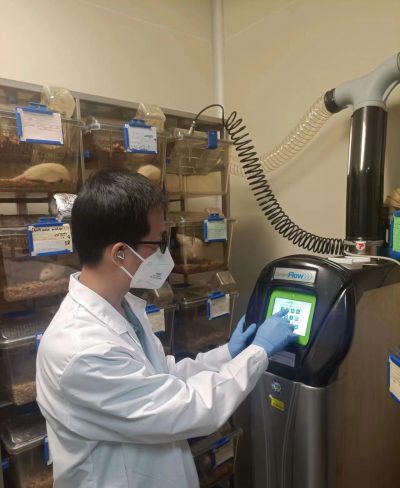
Zheyu CAI checks the air supply of the caging system
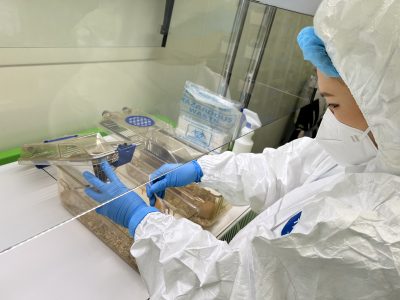
Avery TAM changes the bedding for the mice
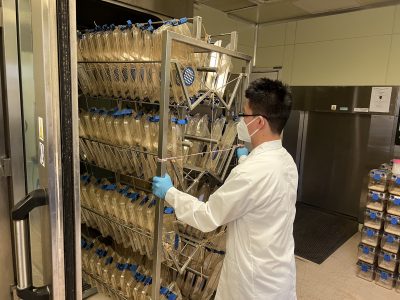
Shaowen WANG assists the cages washing duty during the epidemic
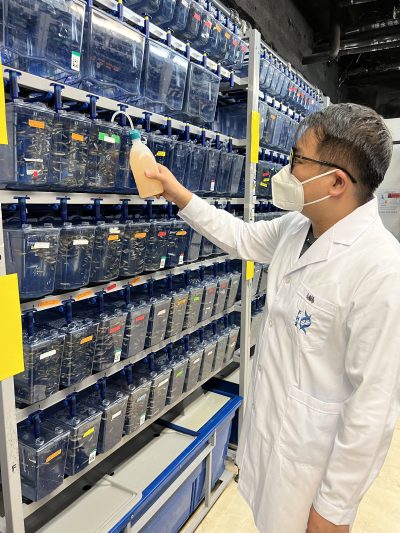
Kun WU assists with fish feeding during the epidemic
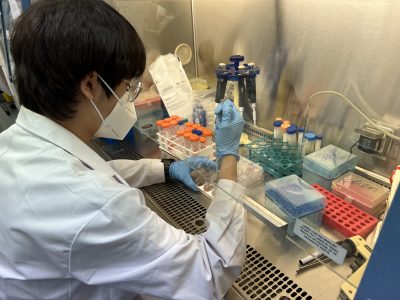
Chengzong HOU replaces the culture medium for cells
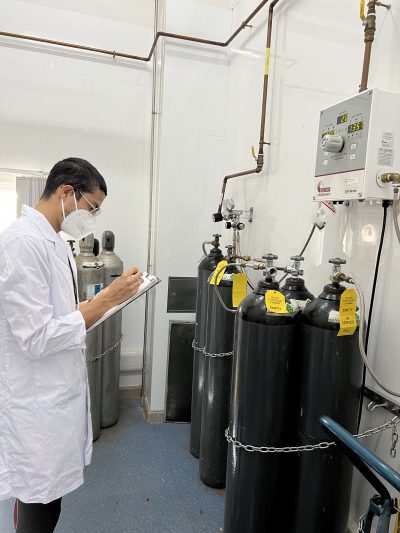
Mariano LUZ records the reading of the gas tank

